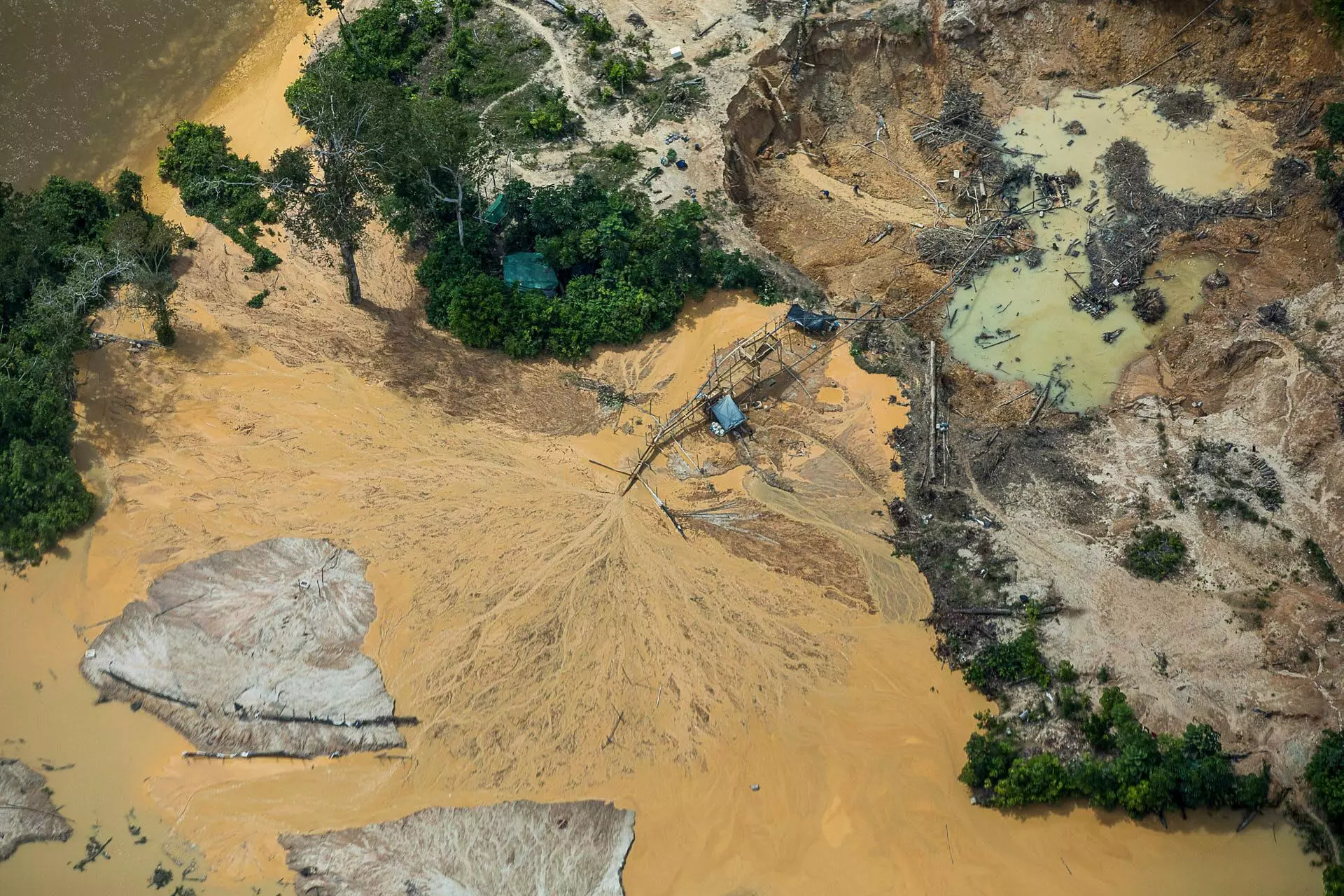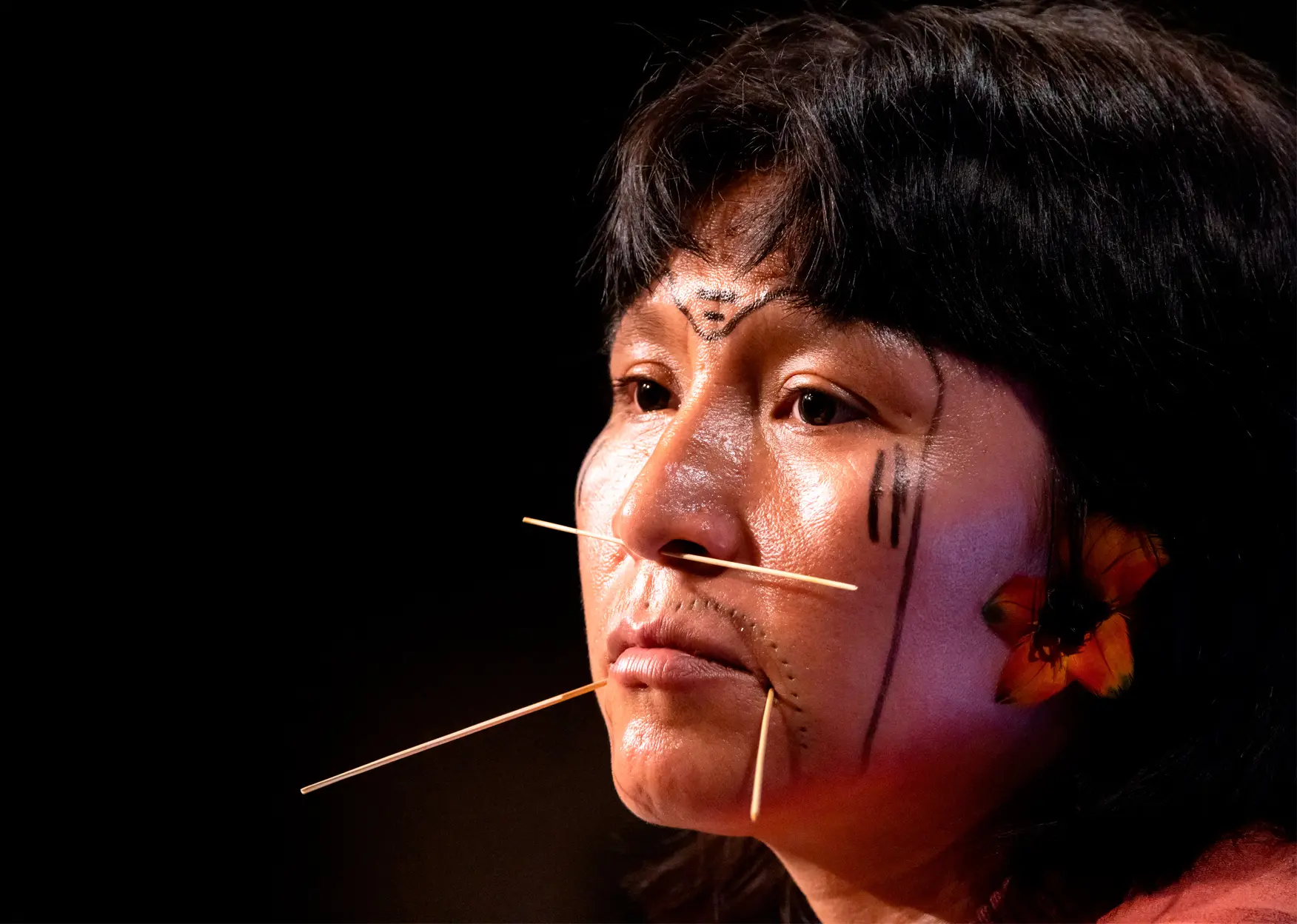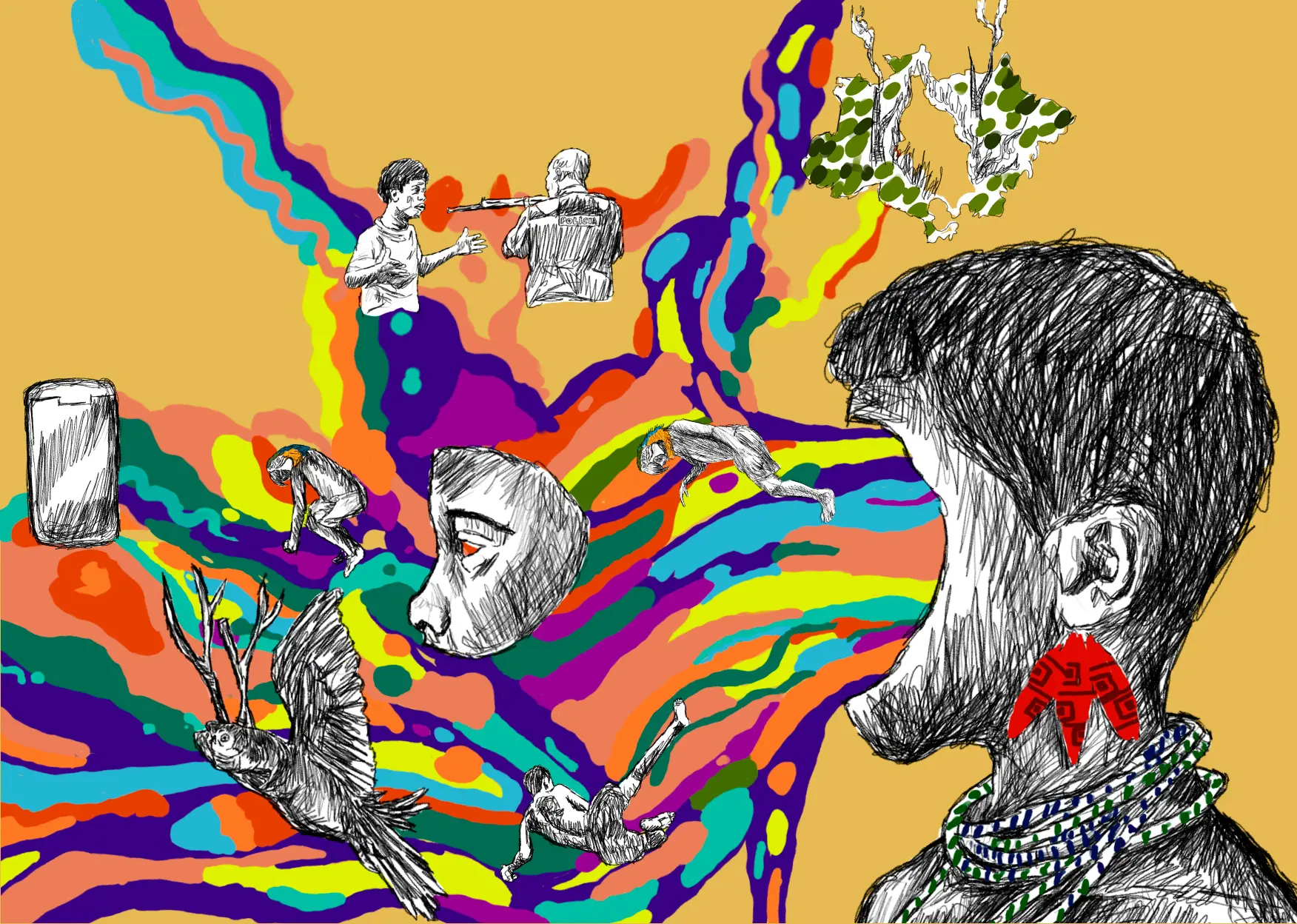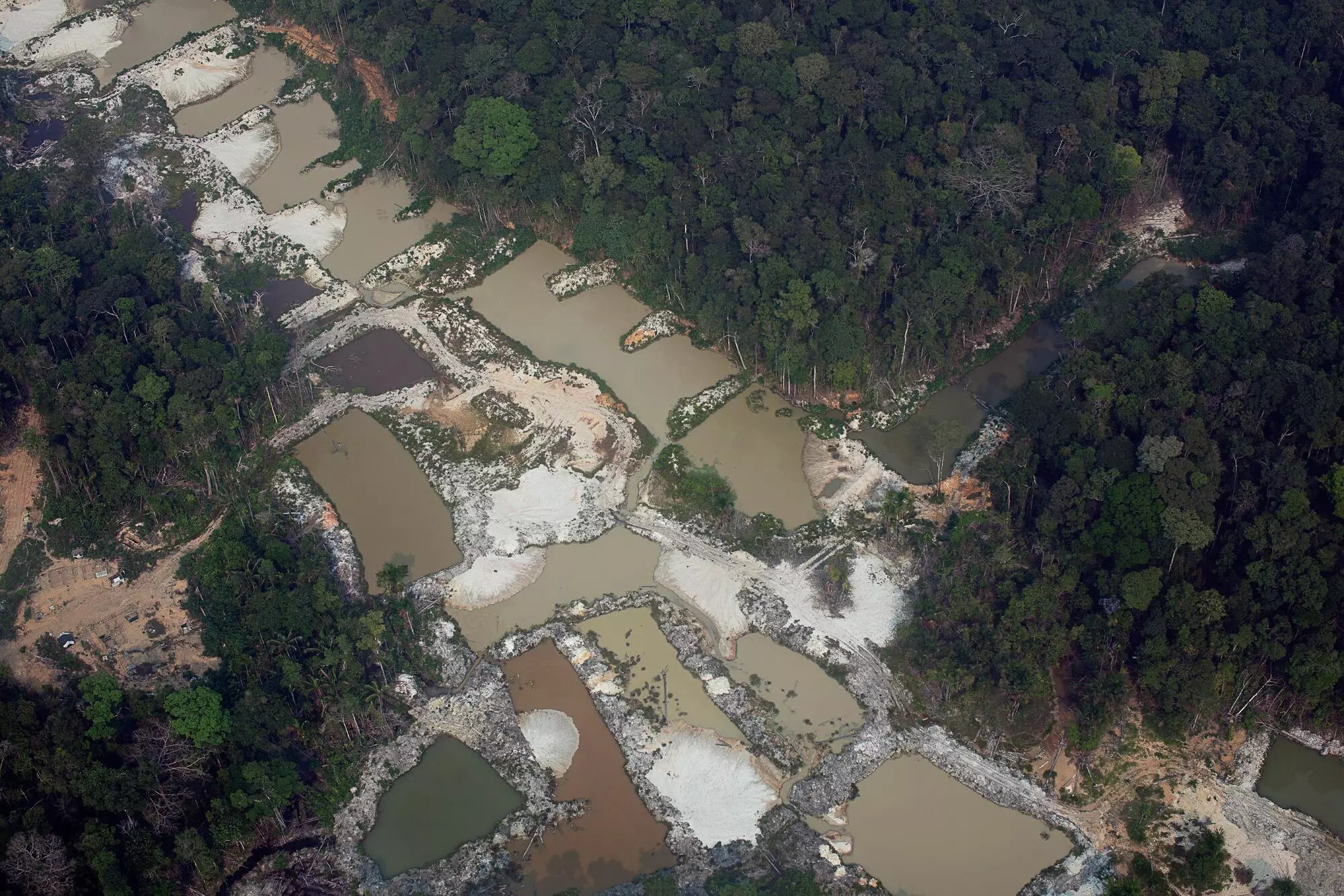Eating a steak coated with gold leaf, as former star Brazilian striker Ronaldo – nicknamed “The Phenomenon” – and current Brazilian national team players Éder Militão and Vinícius Júnior recently did in Qatar, is wrong in so many ways. It does, however, neatly illustrate the impasse we are living through. That Brazilians were involved in the episode is no coincidence, as the country has a central role to play in the Earth’s fate. Home to the Amazon and other globally significant biomes, Brazil will either lead the world to a catastrophic tipping point, or bring about a shift in direction that prioritizes people and not the markets. The choice will depend to a large extent on the consuming of gold and meat – bad even when done separately, but together a recipe for destruction.
Everyone should think twice about buying or using gold. Better still avoid it altogether. Often, people ask what they can do, as individuals, to combat deforestation in the Amazon. While the most important battle is collective, such as pressing for a change in government policies (as the European Union has just demonstrated by prohibiting the purchase of products associated with deforestation) an effective individual act is to join the fight to lower the status of gold, by refusing to buy or wear gold jewelry, which is already limited to a minority who possess the requisite spending power.
In the future, wearing gold should be viewed as an act of equally bad taste to smoking cigarettes. If that seems unlikely, it’s worth remembering that for decades the tobacco industry associated cigarettes with glamor and cool, whether they were on the full lips of Hollywood actresses or those of tough-guy adventurers. Displaying gold on one’s body may soon become as repellent as wearing a fur coat.
There is good reason for this. Anyone who puts a ring (including a wedding ring) on their finger, an earring in their ear, a necklace around their neck or a bracelet on their wrist, could be contributing to the shedding of human blood and the destruction of the Amazon rainforest and other vital enclaves of nature, without which we will never stop the escalation of global warming. Gold mining is one of the most environmentally destructive industries in the world, with a single wedding ring of the type worn by so many generating around 20 tons of waste materials. Twenty tons. Whenever someone wears such a ring, they need to know that it has left behind 20 tons of waste, most of it highly toxic and contaminant, somewhere on the planet. A pair of such rings, as used in traditional wedding ceremonies, produces 40 tons of such highly contaminant waste. These are the calculations people must make if they want the children born of such unions to have a future.
The separation of gold from the rock is usually carried out with chemicals such as mercury, arsenic and cyanide, which contaminate the rivers, soil and air. Large open pit mines destroy the landscape, with the tailings they produce usually accumulating in toxic lakes, formed using dams. According to the United Nations Environment Program, there have been more than 221 major tailings dam collapses around the world, killing hundreds of people, displacing thousands of others and contaminating the drinking water of millions. Even when the dams are solid, poisoned water seeps into the water table, creating a risk of heavy metal poisoning for humans and other species.
So even if the gold on your finger, neck or wrist is certified as sustainable, you are helping to drive the market and increase the social value of this immensely destructive commodity. By purchasing gold, in other words, you are feeding a chain of misery and by using it, you not only accept, but legitimize, a human and environmental catastrophe. While some uses – such as in computers or medical equipment – are inevitable, no such excuses apply to cosmetic gold. And certainly not to the eating of gold, a material which only appears among the ingredients in expensive restaurants as a symbol of ostentation.

Illegal mining in Yanomami Indigenous Territory. Photo: Bruno Kelly/Amazônia Real
In the Amazon, more than 10,000 hectares of forest have already been devastated by gold extraction. Illegal mining results in mercury contamination, which causes harm to indigenous, ribeirinho (traditional forest communities), quilombola (descendants of escaped enslaved peoples who have settled in communities known as quilombos) and urban populations the scale of which is just beginning to be investigated by scientists. Women of the Munduruku people, on the River Tapajós, may be feeding their babies with milk contaminated with mercury, while water and fish, on which their diet is based, are also contaminated. The Yanomami Indigenous Territory has been invaded by an estimated 20,000 illegal miners, some of them under the command of organized crime, who have devastated the forest, prostituting indigenous girls and leading young people into alcoholism and drug use – certain scenes involving young Yanomami would not look out of place in Brazil’s urban favelas, dominated by drug trafficking. Worse still are the diseases, hunger, malnutrition and death.
All of this because of gold. And it is this blood that people wear around their necks or fingers. It is estimated that half of the gold produced in Brazil comes from illegal sources while trade in the commodity is shrouded in such secrecy that most consumers are unaware where the gold in their products comes from, or how it is extracted. While soy, palm oil and beef supply chains are monitored ever more closely, allowing supermarkets to accurately label not just the country but the region and often even the farm where the product was produced, enabling buyers to make an informed ethical choice, tracing the origins of gold is generally much more difficult. The metal often crosses multiple borders to be refined and mixed, making it almost impossible to identify the source. Switzerland, for example, which is famous for its gold, only refines and marks its bars, with no gold actually mined in its bucolic alpine landscapes.
The same is true in Africa and the Middle East, where dozens of small gold refineries have opened in recent years. Uganda, for example, which doesn’t extract much gold, still manages to export more than one billion dollars of the precious metal, as its refineries are a conduit for gold mined in the neighboring Democratic Republic of Congo. This leads to conflicts, and finances militias engaged in interethnic struggles over gold-rich areas. Investigations have shown that illicit gold also flows through China and the Middle East. The United Nations has called for more transparency, but powerful interests have blocked these attempts.
Even when gold mines are legal, the destruction of nature and the lives of forest populations is catastrophic in scale. In Volta Grande do Xingu, a region that has suffered grave damage from the Belo Monte Hydroelectric Power Plant, the Canadian mining company Belo Sun has for years been planning the development of what is described as “the largest open-pit gold mine in Brazil”.
A major legal battle is being fought to prevent the mining company from establishing itself in a region populated by indigenous peoples and ribeirinho communities. But Belo Sun has been in the region for years, co-opting and putting pressure on residents. If it is allowed to establish a base in the region, going against all scientific opinion, which has shown the damage to the ecosystem may be irreversible, mining will be made legal. The veneer of the law, however, will not erase the huge mountain of mostly toxic residues, twice the size of Rio de Janeiro’s famous Pão de Açúcar (Sugarloaf Mountain), that Belo Sun will leave behind. Today, stopping Belo Sun’s advance is the most important battle being fought in the Middle Xingu region. Canada is currently hosting the COP15 Biodiversity Conference, but the socio-environmental harm the country causes around the world is enormous. Its squeaky clean image is a long way from reality.
Blood, deforestation, contamination, disease, hunger and death is the memory left by the gold that passes through a long chain of greenwashing before becoming a desired object in jewelry stores. Is this really what people want to put on their bodies? How can they stroll around knowing the human and environmental cost their gold has produced?
If they cannot change from compassion, perhaps they’ll do so out of selfishness: legal and illegal mining is driving the Amazon and other strategic enclaves of nature to a point of no return, which, if reached, will doom every child on the planet to a hostile future. In the case of the Amazon, this point of no return predicted by scientists represents the destruction of between 20% and 25% of the forest. Today, 17% of the Amazon has been deforested, with another 17% degraded.
Gold plays a key role in this accelerated corrosion, with a string of knock-on effects. Cattle, which provided the meat for the gold leaf steaks of diners such as Ronaldo, are another vector of the devastation of the forest and the emission of greenhouse gasses. The menu at the Nusr-Et restaurant says that its meat is wagyu, which means the cattle from which it came are genetically Japanese. But this meat is also produced in Brazil, and exported to Qatar, meaning there is a reasonable chance that Ronaldo and his friends ate meat from animals that grazed on devastated lands in the Brazilian Amazon.
In combining meat and gold, the phenomenon of stupidity could hardly have made a worse choice. Ronaldo was criticized for his ostentatious behavior in eating the Nusr-Et restaurant’s gold-plated steak, which costs the equivalent of seven times the minimum wage in Brazil, while the national team players by his side were in Qatar representing a country where 33 million people are starving. It was a scene of utter obscenity, yet Ronaldo responded by claiming he wanted to inspire people to strive to reach the same level as him. Could he seriously have been suggesting that this is what starving people should aspire to – to eat and with a bit of luck, shit gold?
His response to the criticism was a jamboree of factual and ethical errors. “The Brazilian team and players have a great responsibility to communicate positive things, and people are confusing football with politics, with hate speech. People are really confused. Today they don’t argue about football, it’s all opinion, giving out shit about rules, the hate speech in football is constant. If a guy eats gold leaf steak, that’s his problem. […]. There’s nothing wrong with it, in fact it could inspire other people.”
Ronaldo was appealing to the concept of meritocracy, the perverse lie that people need only strive harder to reach the top. Strive, like the migrants who died building the World Cup stadiums in Qatar’s corrupt dictatorship? Strive like the domestic staff who make an exhausting journey every day to earn, if they’re “lucky” enough to have an even slightly honest boss, the minimum wage? Strive like the millions who do odd jobs for a few bucks a day? Is it because of a lack of striving that 33 million Brazilians are unable to eat three meals a day? Or that more and more people every day are waiting for trucks that carry the bits of bones previously only fed to dogs?
Ronaldo and the players with him are black men, the most frequent victims in statistical measures of life and death. If they weren’t good at football, they might well be where so many black boys end up: in the cemetery, some of them put there by the “stray” bullets of the police. When complaining about “everything being turned into politics”, Ronaldo made the worst type of political decision, and set the worst possible example. Eating gold isn’t just a problem for the individual, as he says: eating gold is to support and legitimize a chain of blood, death and the destruction of nature.
Eating, and showing off with, gold leaf steak in Qatar is a tremendously destructive and selfish political act, sending a message that says: I don’t care about the blood spilled, the exploitation of nature and people’s bodies, the destruction of the forest and other biomes, the disease and hunger of indigenous children in Brazil, and black children in the Congo and other African countries. Only I matter, because I’m the man and the only reason people can’t do what I do is because they didn’t strive hard enough. I do it just because I can. This attitude, stimulated and molded by capitalism, is what has led the planet to climate collapse, and already harmed the future of our children.
Ronaldo may be eating gold, but he is spreading shit.
Translated by James Young





